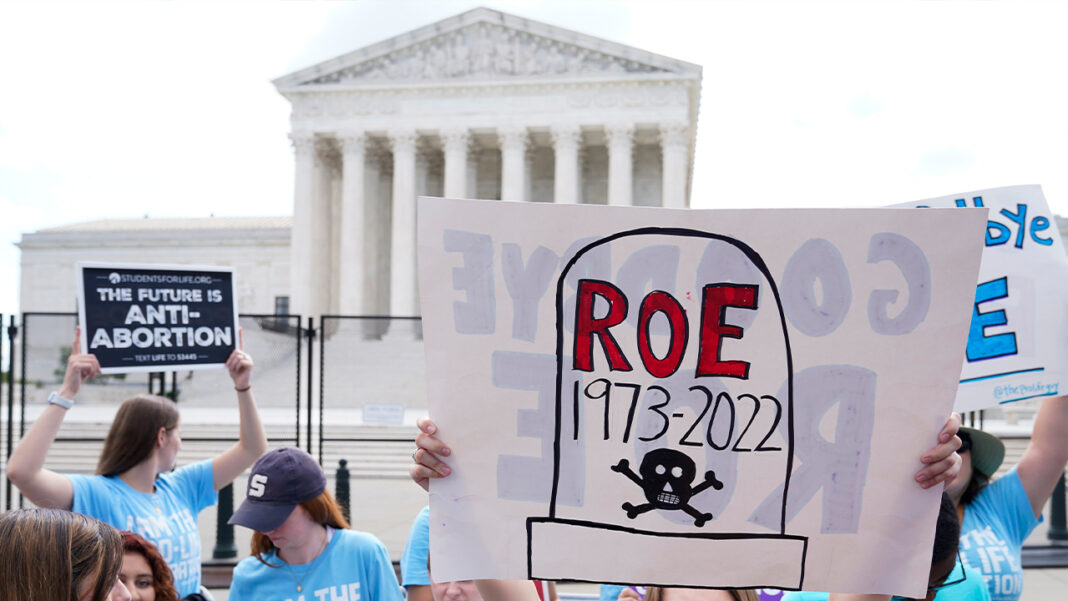LOUISVILLE, Ky. — A judge in Kentucky temporarily blocked that state’s near-total ban on abortions Thursday, while a Florida judge said he would temporarily stop a 15-week ban from taking effect there, as judges across the country weigh whether state constitutions permit the procedure after the U. S.
Supreme Court overturned Roe v. Wade last week . The video featured is from a previous report.
The ruling in Kentucky pauses that state’s so-called trigger law, which was designed to take effect after the nation’s highest court ruled to end federal constitutional protections for abortions. The case reflects battles being waged in courts across the country after the Supreme Court left it up to the states to decide whether abortion is legal within their borders – forcing abortion rights groups to turn to state constitutions for protection. Some of the legal disputes involve trigger laws – like Kentucky’s and Florida’s – that were specifically designed to take effect if Roe were to fall.
Some involve bans that have been on the books, unenforced, for generations. Other entail prohibitions on abortion that were held up pending the ruling on Roe and are now moving forward. RELATED: Which states are banning abortion immediately? State-by-state breakdown of abortion laws, bans In Florida, Judge John C.
Cooper said Thursday that he will temporarily block the 15-week abortion ban from taking effect after reproductive health providers argued the state constitution guarantees a right to the procedure. Cooper said Florida’s ban was “unconstitutional in that it violates the privacy provision of the Florida Constitution. ” Republican Gov.
Ron DeSantis said the state would appeal. Cooper’s decision will not go into effect until he signs a written order – which appeared would not happen before Tuesday – meaning the 15-week ban will likely take effect Friday, as scheduled. The gap raises questions about whether some patients would be affected.
Florida’s current law allows abortion up to 24 weeks, and data from the Centers for Disease Control and Prevention shows the vast majority of the state’s abortions occur before the 15-week cutoff. The flurry of court activity has caused confusion in states and left patients and clinics scrambling. RELATED: Abortion rights supporters fill the streets of cities nationwide following Friday bombshell In Arizona, the attorney general said Wednesday that a total abortion ban that has been on the books since before statehood can be enforced, though the governor disagrees and has said a new law that bans abortion after 15 weeks takes precedence.
Abortion providers in that state immediately stopped performing the procedure out of fear of prosecution. In Louisiana, that attorney general warned doctors against performing abortions, even while a ban there is temporarily blocked. Florida’s law contains exceptions if the procedure is necessary to save the pregnant person’s life, prevent serious injury or if the fetus has a fatal abnormality.
It does not allow exceptions in cases of rape, incest or human trafficking. Reproductive health providers challenged the law based on a 1980 state constitutional amendment guaranteeing a broad right to privacy, which has been interpreted by the state Supreme Court to include abortion. Florida voters reaffirmed the right to privacy in 2012 by rejecting a ballot initiative that would have weakened its protections, plaintiffs said.
The state argued that abortion providers don’t have standing to make a claim of a personal right to privacy because they were acting as third parties on behalf of their patients. Attorneys also said the state’s constitutional right to privacy doesn’t include the right to abortion, arguing that the state has an interest in safeguarding health and protecting potential life. RELATED: How outlawing abortion could worsen America’s maternal mortality crisis In a statement, DeSantis said the Florida Supreme Court previously misinterpreted Florida’s right to privacy to include a right to an abortion.
He said the state rejects that interpretation “because the Florida Constitution does not include – and has never included – a right to kill an innocent unborn child. ” In Kentucky, Thursday’s ruling allowed abortions to resume after they ended abruptly last week. Heather Gatnarek, an attorney for the American Civil Liberties Union of Kentucky, said nearly 200 women with scheduled appointments have been turned away from EMW Women’s Surgical Center, one of the two Louisville abortion clinics, in recent days.
The ACLU and Planned Parenthood released a joint statement saying they were glad the “cruel abortion bans” were blocked, adding that since last week’s ruling, “numerous Kentuckians have been forced to carry pregnancies against their will or flee their home state in search of essential care. Despite this victory, we know this fight is far from over. ” Kentucky Attorney General Daniel Cameron, a Republican running for governor, said Thursday’s ruling had no basis in the state constitution and he intends to challenge it.
“We will do everything possible to continue defending this law and to ensure that unborn life is protected in the Commonwealth,” he said in a statement. RELATED: Some pharmacies limiting Plan B pill purchases as demand spikes Kentucky’s ruling came after abortion clinics filed a lawsuit saying women were being “forced to remain pregnant against their will” in violation of the state’s constitution. They had asked the judge to temporarily block the trigger law along with another Kentucky law that attempted to prevent abortions at six weeks of pregnancy.
Jefferson County Circuit Judge Mitch Perry also agreed to temporarily block the six-week ban. That measure was previously halted by a federal court. Kentucky’s measure contains a narrow exception allowing a physician to perform a procedure necessary to prevent the death or permanent injury of a pregnant woman.
It does not permit abortions in cases of rape or incest. Kentuckians will vote in November on a ballot initiative that, if ratified, would establish that no state constitutional right to abortion exists. Both sides of the abortion debate are busy organizing ahead of the election.
Report a correction or typo.
From: abc7
URL: https://abc7news.com/abortion-rights-kentucky-florida-law/12006758/



